|
|
|
Sort Order |
|
|
|
Items / Page
|
|
|
|
|
|
|
| Srl | Item |
| 1 |
ID:
181914
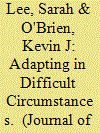

|
|
|
|
|
| Summary/Abstract |
To understand the consequences of Xi Jinping’s rise, one must look down as well as up. Even in the face of increased repression, people have a say over how it unfolds and the shape it takes. Many Chinese pastors are adapting to harsher policies and new ideological narratives by striving to lessen the threat Protestantism is perceived to pose. They reduce ideological competition, by not preaching about politics, dissociating from dissidents, and supporting the China Dream; security concerns, by becoming financially self-sufficient, severing ties to missionaries, and building a Chinese church; and collective action fears, by dividing congregations, avoiding networking, and viewingsmall churches as part of God’s plan. By adjusting Protestant practice and incorporating the Party ideologies into their faith, pastors aim to show they can live with and are being steeled by repression.
|
|
|
|
|
|
|
|
|
|
|
|
|
|
|
|
| 2 |
ID:
088453
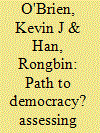

|
|
|
|
|
| Publication |
2009.
|
| Summary/Abstract |
Election procedures in rural China have improved greatly over the last 20 years and a good number of reasonably free and fair elections have been held. But changes in the 'exercise of power' have not kept up with changes in the 'access to power'. In many communities, township authorities, Party branches, and social forces (such as clans, religious groups, and underworld elements) continue to impede democratic rule. This suggests that a purely procedural definition of democracy is problematic and that democratization depends on the power configuration in which elected bodies are embedded. Putting grassroots democracy into place goes well beyond getting the procedures right, and 'high quality' democracy rests on much more than convening good village elections every three years
|
|
|
|
|
|
|
|
|
|
|
|
|
|
|
|
| 3 |
ID:
114854
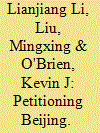

|
|
|
|
|
| Publication |
2012.
|
| Summary/Abstract |
What precipitated the 2003-06 "high tide" of petitioning Beijing and why did the tide wane? Interviews and archival sources suggest that a marked increase in petitioners coming to the capital was at least in part a response to encouraging signals that emerged when Hu Jintao and Wen Jiabao adopted a more populist leadership style. Because the presence of tens of thousands of petitioners helped expose policy failures of the previous leadership team, the Hu-Wen leadership appeared reasonably accommodating when petitioners arrived en masse in Beijing. Soon, however, the authorities shifted towards control and suppression, partly because frustrated petitioners employed disruptive tactics to draw attention from the Centre. In response to pressure from above, local authorities, especially county leaders, turned to coercion to contain assertive petitioners and used bribery to coax officials in the State Bureau of Letters and Visits to delete petition registrations. The high tide receded in late 2006 and was largely over by 2008. This article suggests that a high tide is more likely after a central leadership change, especially if a populist programme strikes a chord with the population and elite turnover augments confidence in the Centre and heightens expectations that it will be responsive to popular demands.
|
|
|
|
|
|
|
|
|
|
|
|
|
|
|
|
| 4 |
ID:
081520


|
|
|
|
|
| Publication |
2008.
|
| Summary/Abstract |
Rural protest leaders in China play a number of roles. Among others, they lead the charge, shape collective claims, recruit activists and mobilize the public, devise and orchestrate acts of contention, and organize cross-community efforts. Protest leaders emerge in two main ways. Long-standing public figures initiate popular action on their own or in response to requests from other villagers; and ordinary villagers evolve into protest leaders when efforts to seek redress for a personal grievance fail. Rural officials sometimes attempt to co-opt or buy off protest leaders, but more often turn to repression. Although cracking down may inhibit further contention, at other times it firms up the determination of protest leaders and makes them more prone to adopt confrontational tactics, partly by enhancing their popular support, partly by increasing the costs of withdrawal
|
|
|
|
|
|
|
|
|
|
|
|
|
|
|
|
| 5 |
ID:
124639
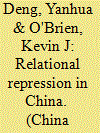

|
|
|
|
|
| Publication |
2013.
|
| Summary/Abstract |
Chinese local officials frequently employ relational repression to demobilize protesters. When popular action occurs, they investigate activists' social ties, locate individuals who might be willing to help stop the protest, assemble a work team and dispatch it to conduct thought work. Work team members are then expected to use their personal influence to persuade relatives, friends and fellow townspeople to stand down. Those who fail are subject to punishment, including suspension of salary, removal from office and prosecution. Relational repression sometimes works. When local authorities have considerable say over work team members and bonds with protesters are strong, relational repression can help demobilize protesters and halt popular action. Even if relational repression does not end a protest entirely, it can limit its length and scope by reducing tension at times of high strain and providing a channel for negotiation. Often, however, as in a 2005 environmental protest in Zhejiang, insufficiently tight ties and limited concern about consequences creates a commitment deficit, partly because thought workers recognize their ineffectiveness with many protesters and partly because they anticipate little or no punishment for failing to demobilize anyone other than a close relative. The practice and effectiveness of relational, "soft" repression in China casts light on how social ties can demobilize as well as mobilize contention and ways in which state and social power can be combined to serve state ends.
|
|
|
|
|
|
|
|
|
|
|
|
|
|
|
|
| 6 |
ID:
137499
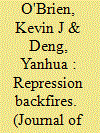

|
|
|
|
|
| Summary/Abstract |
In spring 2005, villagers in Dongyang County, Zhejiang were unhappy. For four years they had been complaining about pollution emitted by 13 factories located in the Zhuxi Chemical Park, but nothing had been done. So they set up a tent encampment to block delivery of supplies to the factories. At first, they employed restrained tactics, including going about daily life in the tents, badgering cadres sent to demobilize them, and kowtowing. After a harsh repression produced hundreds of injuries and left dozens of damaged vehicles and other evidence of police action strewn about, the tent-sitters switched to more aggressive tactics, including denouncing local leaders, carrying out mock funerals, interrogating factory owners and ransacking the homes of ‘traitors’. The authorities' ill-considered and poorly-timed repression led to tactical escalation, helped draw thousands of people to the scene, and ultimately resulted in the chemical park being closed. This episode speaks to the ‘dissent–repression nexus’ and suggests that repression can be counterproductive when it encourages protesters to ratchet up their tactics and a ‘protest spectacle’ ensues. In today's China, striking displays and theatrical performances, especially in the wake of a crackdown, can attract an audience, bring in financial support and create a carnival-like atmosphere in which popular acclaim, the breakdown of social order and the inversion of power hierarchies grants protesters leverage and induces the authorities to make concessions.
|
|
|
|
|
|
|
|
|
|
|
|
|
|
|
|
| 7 |
ID:
130449
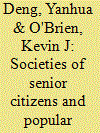

|
|
|
|
|
| Publication |
2014.
|
| Summary/Abstract |
Societies of Senior Citizens (SSCs) are often thought to be non-political organizations focused on community traditions and services for the elderly. In Huashui Town, Zhejiang, however, SSCs took the lead in mobilizing protest and caused 11 factories to be closed. From 2004 to 2005, SSCs helped to fund a lawsuit, engineered a petition drive and organized tent-sitting at a chemical park notorious for its pollution. Huashui's SSCs were effective mobilizing structures owing to their strong finances, organizational autonomy, effective leadership and the presence of biographically available, unafraid older villagers. Skillful mobilization led to efforts to rein in village SSCs and a reorganization which, however, had only a limited effect. SSC experiences in Huashui suggest that organized protest in China is more feasible than often thought and that understandings of protest outcomes should go beyond the success or failure of an episode to explore long-term consequences for the organizations involved.
|
|
|
|
|
|
|
|
|
|
|
|
|
|
|
|
| 8 |
ID:
105827
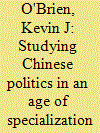

|
|
|
|
|
| Publication |
2011.
|
| Summary/Abstract |
The relationship between area studies and political science is fraught with tradeoffs. In particular, a danger exists that the field of Chinese politics is being hollowed out because (a) there are many islands of highly specialized research with few bridges between them; and (b) more and more Chinese politics scholars are engaged in debates in which the 'other side' is no longer a China scholar but instead a colleague in the discipline. At a time when China's economic growth and prominence in world affairs have generated remarkable interest inside and outside the academy, few scholars are willing to take a stab at characterizing the polity or addressing other, equally large questions. Further thought is needed about the 'terms of enlistment' for China scholars in political science, in an era when ever more-focused studies and greater participation in disciplinary debates have become the norm.
|
|
|
|
|
|
|
|
|
|
|
|
|
|
|
|
|
|
|
|
|